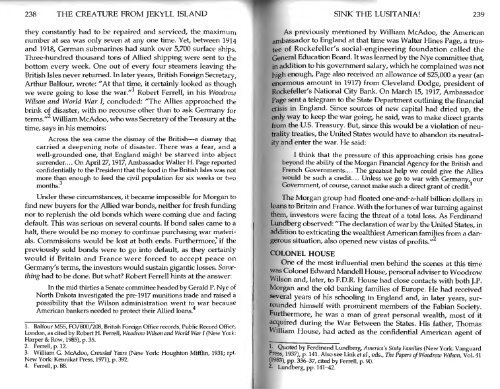Create successful ePaper yourself
Turn your PDF publications into a flip-book with our unique Google optimized e-Paper software.
238 THE CREATURE FROM JEKYLL ISLAND SINK THE LUSITANIA! 239<br />
they constantly had to be repaired and serviced, the maximum<br />
number at sea was only seven at any one time. Yet, between 1914<br />
and 1918, German submarines had sunk over 5,700 surface ships.<br />
Three-hundred thousand tons of Allied shipping were sent to the<br />
bottom every week. One out of every four steamers leaving the<br />
British Isles never returned. In later years, British Foreign Secretary,<br />
Arthur Balfour, wrote: "At that time, it certainly looked as though<br />
we were going to lose the war/' Robert Ferrell, in his Woodrow<br />
Wilson and World War J, concluded: "The Allies approached the<br />
brink of disaster, with no recourse other than to ask Germany for<br />
terms."<br />
William McAdoo, who was Secretary of the Treasury at the<br />
time, says in his memoirs:<br />
Across the sea came the dismay of the British—a dismay that<br />
carried a deepening note of disaster. There was a fear, and a<br />
well-grounded one, that England might be starved into abject<br />
surrender.... On April 27, 1917, Ambassador Walter H. Page reported<br />
confidentially to the President that the food in the British Isles was not<br />
more than enough to feed the civil population for six weeks or two<br />
months.<br />
rAs<br />
previously mentioned by William McAdoo, the American<br />
ambassador to England at that time was Walter Hines Page, a trustee<br />
of Rockefeller's social-engineering foundation called the<br />
General Education Board. It was learned by the Nye committee that,<br />
in addition to his government salary, which he complained was not<br />
high enough, Page also received an allowance of $25,000 a year (an<br />
enormous amount in 1917) from Cleveland Dodge, president of<br />
Rockefeller's National City Bank. On March 15, 1917, Ambassador<br />
Page sent a telegram to the State Department outlining the financial<br />
crisis in England. Since sources of new capital had dried up, the<br />
only way to keep the war going, he said, was to make direct grants<br />
from the U.S. Treasury. But, since this would be a violation of neutrality<br />
treaties, the United States would have to abandon its neutrality<br />
and enter the war. He said:<br />
I think that the pressure of this approaching crisis has gone<br />
beyond the ability of the Morgan Financial Agency for the British and<br />
French Governments.... The greatest help we could give the Allies<br />
would be such a credit.... Unless we go to war with Germany, our<br />
Government, of course, cannot make such a direct grant of credit. 1<br />
Under these circumstances, it became impossible for Morgan to<br />
find new buyers for the Allied war bonds, neither for fresh funding<br />
nor to replenish the old bonds which were coming due and facing<br />
default. This was serious on several counts. If bond sales came to a<br />
halt, there would be no money to continue purchasing war materials.<br />
Commissions would be lost at both ends. Furthermore^ if the<br />
previously sold bonds were to go into default, as they certainly<br />
would if Britain and France were forced to accept peace on<br />
Germany's terms, the investors would sustain gigantic losses. Something<br />
had to be done. But what? Robert Ferrell hints at the answer:<br />
In the mid thirties a Senate committee headed by Gerald P. Nye of<br />
North Dakota investigated the pre-1917 munitions trade and raised a<br />
possibility that the Wilson administration went to war because<br />
American bankers needed to protect their Allied loans.<br />
1. Balfour MSS, FO/800/208, British Foreign Office records, Public Record Office,<br />
London, as cited by Robert H. Ferrell, Woodrow Wilson and World War I (New York:<br />
Harper & Row, 1985), p. 35.<br />
2. Ferrell, p. 12.<br />
3. William G. McAdoo, Crowded Years (New York: Houghton Mifflin, 1931; rpt.<br />
New York: Kennikat Press, 1971), p. 392.<br />
4. Ferrell, p. 88.<br />
The Morgan group had floated one-and-a-half billion dollars in<br />
loans to Britain and France. With the fortunes of war turning against<br />
them, investors were facing the threat of a total loss. As Ferdinand<br />
Lundberg observed: "The declaration of war by the United States, in<br />
addition to extricating the wealthiest American families from a dangerous<br />
situation, also opened new vistas of profits." 2<br />
COLONEL HOUSE<br />
One of the most influential men behind the scenes at this time<br />
was Colonel Edward Mandell House, personal adviser to Woodrow<br />
Wilson and, later, to F.D.R. House had close contacts with both J.P.<br />
Morgan and the old banking families of Europe. He had received<br />
several years of his schooling in England and, in later years, surrounded<br />
himself with prominent members of the Fabian Society.<br />
Furthermore, he was a man of great personal wealth, most of it<br />
acquired during the War Between the States. His father, Thomas<br />
William House, had acted as the confidential American agent of<br />
1- Quoted by Ferdinand Lundberg, America's Sixty Families (New York: Vanguard<br />
Press, 1937), p. 141. Also see Link et al, eds., The Papers of Woodrow Wilson, Vol. 41<br />
(1983), pp. 336-37, cited by Ferrell, p. 90.<br />
2- Lundberg, pp. 141-42.


